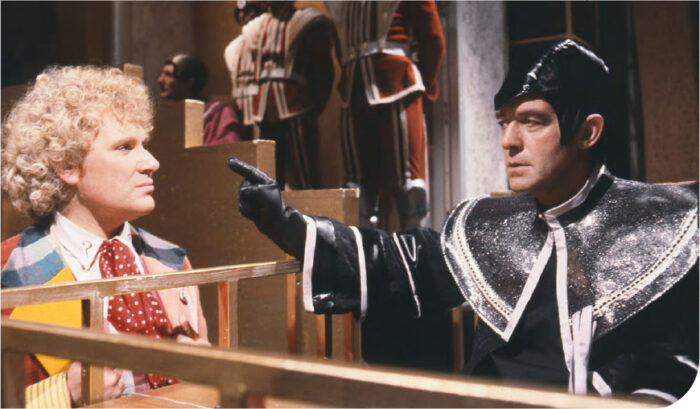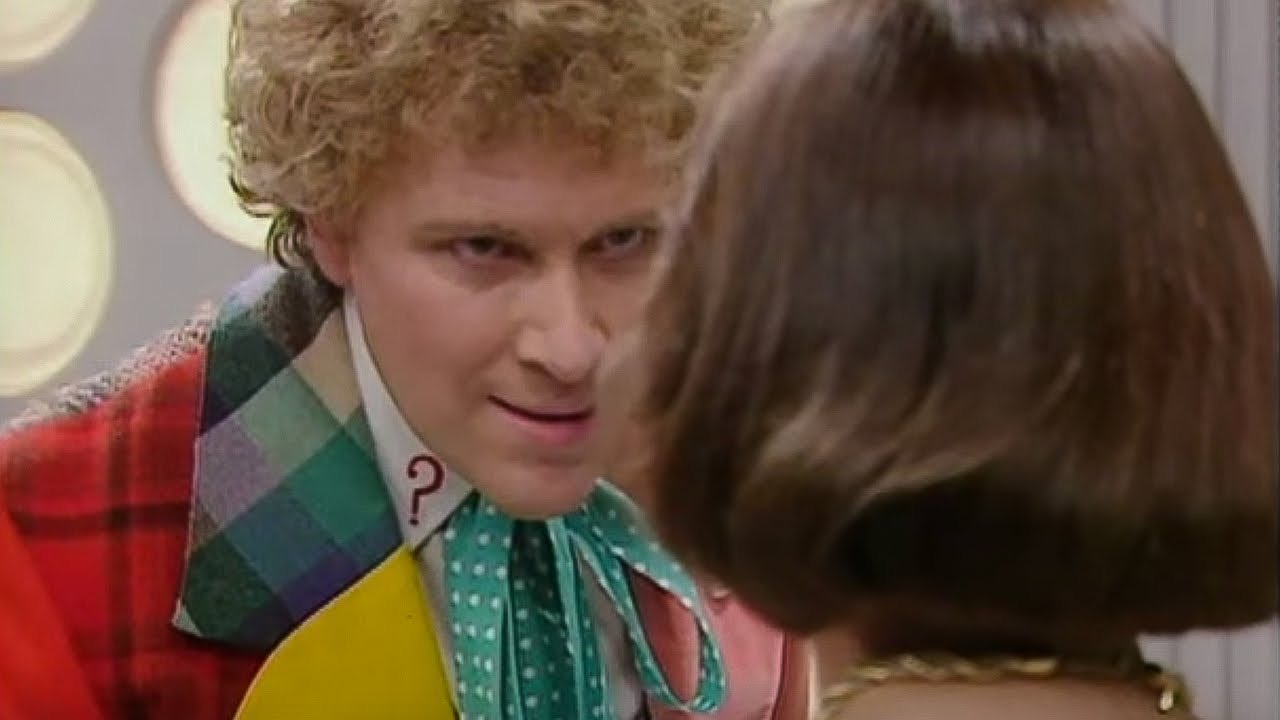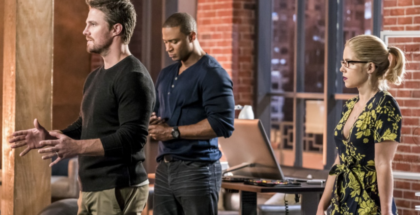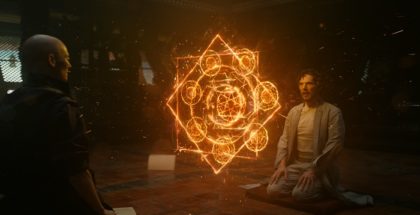Classic Doctor Who: The Trial of a Time Lord
Mark Harrison | On 10, Sep 2023
Offering more than 600 Classic Doctor Who episodes broadcast between 1963 and 1996, BritBox and BBC iPlayer’s The Whoniverse are bigger on the inside. If you’ve watched all of the new series already, then why not join us as we turn on the TARDIS randomiser for a monthly primer on the adventures of the first eight Doctors…
Long before Flux but a little after The Key To Time did it first, Season 23 of Doctor Who tied all of its serials together as The Trial of a Time Lord. The Sixth Doctor’s era hadn’t had the best start in the TV ratings or with the critics, and after the longest break in production since the series started in 1963, Colin Baker’s second season literally presented the case for prosecution and the defence.
In a throwback to the Doctor’s beginnings on the run in a stolen TARDIS, the story lifts our hero out of time and space and takes him back to Gallifrey to stand trial before the Inquisitor (Lynda Bellingham) and the High Council of the Time Lords for violating their cardinal law against meddling in time and space. His prosecutor, the Valeyard (Michael Jayston), calls for the death penalty and the court spends all season watching past, present, and future episodes of Doctor Who as evidence.
The trial sees the departure of Peri Brown (Nicola Bryant), the arrival of Melanie “known as Mel” Brown (Bonnie Langford), a returning baddy or two, and a potentially game-changing revelation at its close. But how does it all hang together? All rise for the twenty-third season of Doctor Who…
Previously on Doctor Who…
The Fifth Doctor’s final adventure, The Caves Of Androzani (Season 21, 1984), is a truly spectacular ending to Peter Davison’s tenure. In one of the bigger misjudgements in Doctor Who history, the season finale, The Twin Dilemma, introduces the Sixth Doctor as a violent and unstable incarnation who then didn’t appear on telly again for nine months.
It’s the most timey-wimey thing in all of Doctor Who that there’s no possible way Frasier Crane, whose first Cheers appearance didn’t air on US TV until months after this went out, could possibly have influenced Baker’s performance and characterisation. He’s an especially pompous incarnation, but when written well, he’s likeable in the same way as Frasier’s smugness and superiority are grounded in social anxiety. It helps that he doesn’t strangle anyone after that first story too.
Frequently ranked dead-last in fan polls, The Twin Dilemma hardly got Baker off to the best start. Under returning script editor Eric Saward, Season 22 gallops into darker, more violent fan service, parading old characters like the Daleks, the Cybermen, the Sontarans, the Master and even Patrick Troughton’s Second Doctor again.
Given the reception to this season from general audiences and BBC higher-uppers Michael Grade and Jonathan Powell, it shouldn’t have been any surprise that the axe was hanging over the show. However, when it leaked to the press that the programme’s future was in the balance, there was uproar, and a fan campaign argued the decision down from outright cancellation to an 18-month hiatus.
While developing the next season, Saward and producer John Nathan-Turner came up with the idea of putting the Doctor on trial, both as a callback to the series’ earliest days and a mission statement about the programme’s future. There are ups and downs, but all things considered, we’re just not sure indignant, season-long meta-commentary was the best way to go.
The Mysterious Planet (Parts 1 – 4)
“Doctor, why did you go to Ravalox?”
The season opens with the final completed serial written by Doctor Who legend Robert Holmes – he was also due to write the finale, but we’ll come to that. The Mysterious Planet opens the court proceedings on Gallifrey and then puts a past escapade for the Doctor forward in evidence, showing his meddling in the affairs of the planet Ravalox, where Queen Katryca (Joan Sims) and her human tribe wage war against a mad robot called Drathro.
Holmes lends something to this opening throwback – including intergalactic rogue Sabalom Glitz, played by Tony Selby – but as a look at Doctor Who’s past, it’s only going back about as far as the start of the Nathan-Turner years. It’s a very late Tom Baker outing, complete with a society where science has already become mythology. In the telling, it shares more than a little in common with 2020’s Orphan 55 too – take from that what you will!
Mindwarp (Parts 5 – 8)
“Protect me, I am your lord and master!”
One of Season 22’s high points was the creation of the Mentors, sluggy disaster capitalists led by Sil (Nabil Shaban) in Vengeance on Varos. So it’s nice to see him back in Mindwarp, the adventure that the Doctor was embroiled in when he was apprehended. Here, Sil is attempting to secure a new host for his ailing superior Lord Kiv (Christopher Ryan). And there’s plenty of “conduct unbecoming of a Time Lord” on the Doctor’s part, but the shattering conclusion only comes after he’s departed.
In “the present” of the trial, Varos writer Philip Martin takes stock of the approach to the Sixth Doctor, once again rendering him unstable for story reasons, but this time zeroing in on how this affects Peri. And, for the most part, Bryant is paired well with guest star Brian Blessed as warrior king Yrcanos, who’s great precisely because he’s what the show has forgotten how to be – he has no shame about the material and absolute command of how he comes across. Varoonik!
Terror of the Vervoids (Parts 9 – 12)
“The future? Is it going to be the Doctor’s defence that he improves?”
When Season 23 was commissioned, the BBC decreed that it would need to be less violent and more humorous than the season before. To that end, Terror Of The Vervoids is effectively the pitch for seasons to come, introducing Langford’s cheery fitness enthusiast, Mel, as the next companion and setting up an Agatha Christie-flavoured mystery involving plant monsters on a 30th-century space cruise liner. There’s a Poirot-worthy guest cast of suspects and victims too, including Honor Blackman, Malcolm Tierney, Denys Hawthorne and Arthur Hewlett.
By this point in the season, it’s been eight episodes of looking backwards and crash-zooming on Colin Baker’s face before the credits start, and now we get something new. The Christie elements in Pip and Jane Baker’s scripts never rise above pastiche and their trademark tortuous dialogue is present and correct, but depending on your mood, this is a pleasing return to formula in the midst of a season that’s arch by design. And that first cliffhanger is one of the best of the decade.
The Ultimate Foe (Parts 13 – 14)
“The truth can’t harm me.”
As in the most sensational trials, The Ultimate Foe closes with multiple surprise witnesses, including Glitz, Mel and another returning baddy (he’s such a drama queen) before a startling new enemy is revealed. Dickens’ A Tale of Two Cities is quoted at one point, but in a season that homages the structure of A Christmas Carol, this is quite literally the Doctor fighting the ghost of Doctor Who yet to come, if the show doesn’t change its ways.
The first episode of the two-part finale was written by Holmes, who passed away before he could write the second. Meanwhile, Saward resigned after disagreements with Nathan-Turner, prompting a last-minute remount of the finale by Pip and Jane Baker. Inevitably, it’s a surreal and scattershot end to the season, but it’s a striking one, boasting one of Colin Baker’s very best TV performances as the Doctor.
Verdict and case notes (contains spoilers)
“Carrot juice? Carrot juice, carrot juice, carrot juice…”
The Trial of a Time Lord is an interesting idea, executed with all the panache we’ve come to expect from Saward, Nathan-Turner and the 1980s Who crew. Sarcasm aside, the self-absorbed clip-show format doesn’t quite write Doctor Who’s death warrant, but it necessitates a change going forward.
As detailed in this column before, the BBC decided to terminate Colin Baker’s contract for Season 24. It must have been massively frustrating because whatever the faults with his era, they’re not his. He’s a good Doctor, even though he’s often given atrocious scripts. He grows into his take on the role in various Big Finish audio plays that far outstrip his televised adventures.
The Valeyard is ultimately forecast as a distillation of all that’s bad in the Doctor that would manifest in between his 12th and final incarnations – we’re currently up to at least 18 in the TV show alone and that hasn’t really come to pass, unless you count Toby Jones’ psychic-hay-fever demon the Dream Lord in the 2010 story Amy’s Choice. It’s almost like these finales where the Master turns up to explain Time Lord treachery and reveal secret incarnations of the Doctor never come to anything in the long run, eh?
Mel went on to travel with Sylvester McCoy’s Seventh Doctor, and Sabalom Glitz also came back in the season finale, Dragonfire (Season 24, 1987). And of course, Bonnie Langford returns as Mel in Ncuti Gatwa’s first season, almost 40 years after she made her debut.

























